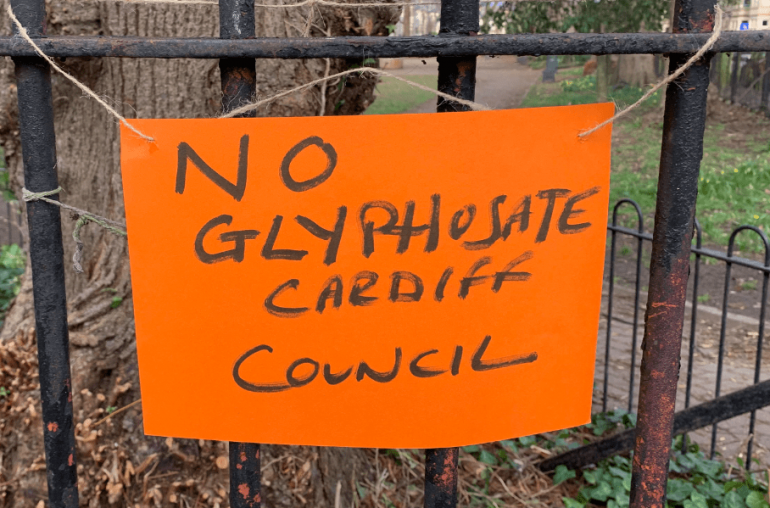Response comes after Cardiff trial concludes that glyphosate is least harmful way to kill weeds
THE use by Cardiff council of a controversial weedkiller has brought criticism from activist groups over its potential danger to bees and worms.
More than 40 councils across the UK have committed to banning or phasing out glyphosate, and in some cases all pesticides, but at the time of publication no council from Wales had been included on this list.
“We really think that Cardiff lacks in ambition,” said campaigner Emma Pavens De Ceccatty.
“They have this great opportunity to lead for Wales.”
Glyphosate, which is used to help clear the city’s pavements, has been linked to causing damage to the eco-system.
“Councils use it to kill plants, but it very much has effects beyond that and that’s a real worry,” said Mrs De Ceccatty from the Pesticide Action Network, a group which opposes the use of such weedkillers.
“If it rains after you use it then that chemical could run off into our water system and it has been shown to be toxic to different aquatic species. Our waters are already incredibly polluted.”
The pesticide can also be fatal to some species of insects and invertebrates, such as honeybees and earthworms, according to Mrs De Ceccatty.
“We’re in an insect apocalypse and we’re using these chemicals which have been associated with killing off things like honeybees who bring these chemicals back into their hive after pollinating infected flowers and it can then affect their reproduction.”
In a statement a council spokesperson recognised the potential impact that glyphosate could have on pollinator species but said the “the evidence on this is blurred”.
“This is something we’re very conscious of. It’s one of the reasons we have committed to reviewing the use of glyphosate in all of our parks, with a view to further reducing our usage.
“(But) ultimately all methods of weed control can have unintended impacts on pollinators and other invertebrates.
“For example hot foam requires the application of very high volumes of boiling water, which could kill any wildlife it came into contact with. Even the mechanical removal of weeds using metal brushes or tools has the potential to kill wildlife.”
Cardiff council ran a trial testing the use of alternative weed control measures in January and said it had discovered that glyphosate was the most effective and environmentally friendly option.
Among the other methods tested were a hot foam treatment and acetic acid, a highly concentrated form of vinegar.
“The responsible glyphosate-based approach to weed control currently used by the council is the most sustainable method of weed control currently available in the UK”, said Dr Dan Jones from Swansea University, who oversaw the trial.
“What we found was that not only is glyphosate the most efficient and effective way of controlling weeds, but once you look at the full life cycle of the product, factoring in things like the amount of fuel and water-used, it is also the least damaging to the environment”.
However the Pesticide Action Network claimed the trial was flawed.
“When Cardiff council tried using hot foam streaming they used it in the same way they would use glyphosate when it’s meant to be used in a different way,” said Mrs De Ceccatty.
“Glyphosate use has also been associated with worsening chronic conditions for children in particular and these chemicals are going to be sprayed in our streets and in our playgrounds,” said Mrs De Ceccatty.
“Why take a risk when there are alternatives?”
In response, a spokesperson for the council said the use of the pesticide did not pose any threat to the public.
“Glyphosate-based herbicides are currently fully licensed as being safe for use in the public realm.
“The product we use carries no warning labels, which means even our weed control contractors are not legally required to wear protective equipment such as masks or gloves when applying it.”
Cardiff Civic Society told The Cardiffian it had asked Cardiff Council for its spraying schedule so that “we can inform citizens so that they, their children and dogs can avoid the areas being sprayed if they wish to do so”.
However the group said Cardiff council had said this would not be possible due to issues over flexibility.
Mrs De Ceccatty said that for Cardiff Council to effectively replace the use of glyphosate, a change in strategy was needed.
“A lot of these councils are looking for a like-for-like replacement but the reality is replacing the use of glyphosate actually takes a more holistic approach.
“It takes a year-long plan and it takes a nuanced approach – prevention rather than cure.”
Among the alternative treatments suggested by Mrs De Ceccatty were preventing soil build-up and mulching.
“These alternatives are going to kill a weed the same way that glyphosate does but it’s not going to create all of those secondary effects,” said Mrs De Ceccatty.



